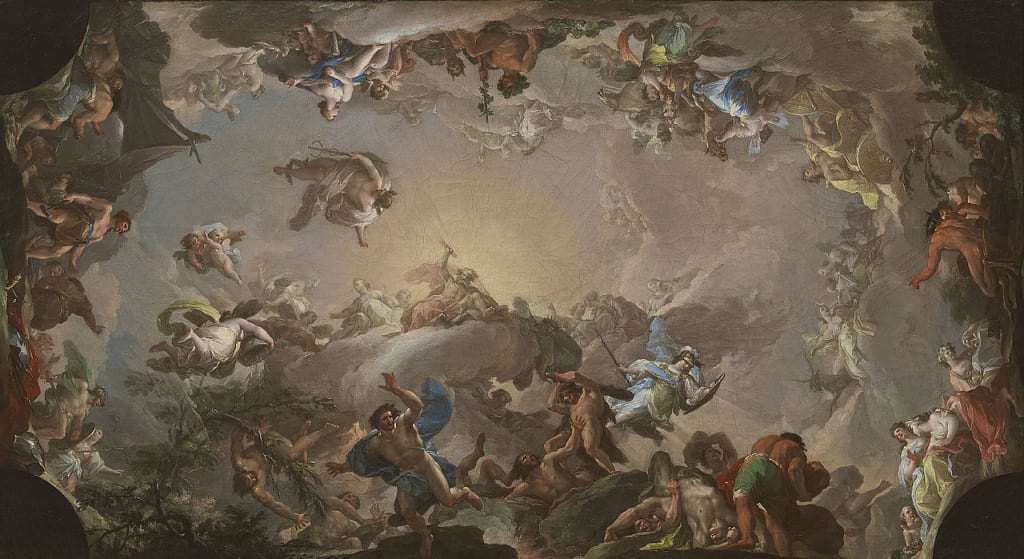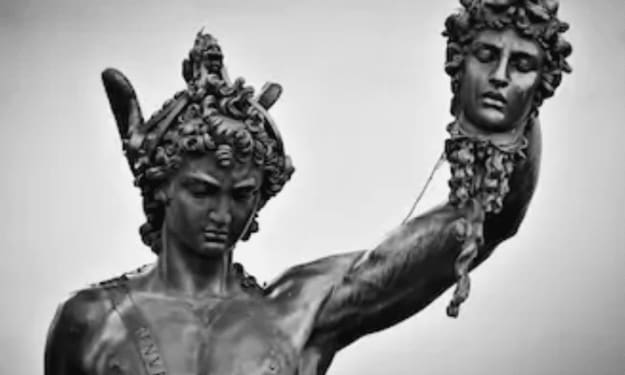
In the ancient realm of Greek mythology, a war of epic proportions unfolded, pitting gods against gods, heroes against monsters, and mortals against destiny. It was a conflict that would shape the fate of both the heavens and the mortal world.
Zeus, the mighty king of the gods, had grown wary of the rebellious Titans who had ruled before him. Gathering his divine brethren, he marshaled the forces of Olympus for a decisive battle. On one side stood Zeus, Poseidon, Athena, Apollo, and a host of other Olympian deities. On the other side were the Titans, led by the powerful Cronus and his loyal children.
The clash began with a thunderous roar, as Zeus hurled lightning bolts with unmatched fury, illuminating the sky and striking fear into the hearts of his enemies. The Titans fought valiantly, wielding their elemental powers to counter the divine onslaught. The earth shook beneath them as Poseidon summoned massive tidal waves, and Apollo's fiery arrows rained down upon the Titan ranks.
As the war waged on, brave heroes emerged from the mortal realm, answering the call to aid the gods. The mighty Hercules, armed with his lion's skin and club, clashed with the monstrous giants, toppling them with his unmatched strength. Perseus, armed with the reflective shield of Athena, slew the venomous Gorgon Medusa, turning the tides of battle in favor of the Olympians.
Amidst the chaos, the goddess Athena fought with unparalleled skill and strategy. Her wisdom guided the Olympians, and her spear struck true against the Titans. The goddess Hera rallied the gods, inspiring them to fight with unwavering determination. Hermes, the messenger of the gods, darted across the battlefield, delivering critical messages and aiding those in need.
As the war raged on for years, a pivotal moment arrived. Zeus, wielding his powerful thunderbolt, engaged Cronus in a climactic duel. Their clash shook the heavens and echoed across the mortal realm. Zeus, with his divine strength and newfound allies, managed to overpower Cronus, severing his control over the Titans.
With Cronus defeated, Zeus and his allies banished the Titans to the depths of Tartarus, where they would remain imprisoned for eternity. The Olympians emerged victorious, establishing their reign as the new pantheon of gods.
The war's aftermath brought about a new era in Greek mythology. The gods assumed their positions on Mount Olympus, shaping the destiny of mortals and guiding the affairs of the world. The heroic deeds of the mortal warriors and demigods were immortalized, serving as reminders of courage, honor, and the eternal struggle between good and evil.
The war of Greek mythology left a lasting impact on the world. The gods' tales and their influence continued to resonate through the ages, captivating the imaginations of storytellers, poets, and artists. The lessons learned from the war served as cautionary tales, teaching mortals the consequences of hubris and the importance of finding balance in the face of power.
The echoes of that ancient war can still be heard today, in the myths and legends that have shaped human culture. The legacy of the Greek mythology war reminds us of the eternal struggle between opposing forces and the potential for heroism and redemption in the face of overwhelming odds.
The Trojan War was a ten-year war fought between the Greeks and the Trojans. The war was caused by the abduction of Helen, the wife of Menelaus, king of Sparta, by Paris, the son of the Trojan king, Priam.
Trojan War greek mythologyOpens in a new window
Britannica
Trojan War greek mythology
The Greeks assembled a large army and fleet, and sailed to Troy. They besieged the city for ten years, but were unable to capture it. Finally, they devised a plan to trick the Trojans. They built a large wooden horse, and hid a group of soldiers inside. They then pretended to sail away.
The Trojans were overjoyed, and dragged the horse into the city. That night, the Greek soldiers crept out of the horse and opened the gates for the rest of the Greek army. The Greeks entered the city and sacked it, killing many of the Trojans.
The Trojan War was a long and bloody conflict, and it had a profound impact on Greek culture. It is one of the most famous stories in Greek mythology, and it has been told and retold in many different ways.
Here are some of the most famous heroes and villains from the Trojan War:
Achilles: Achilles was the greatest warrior of the Greek army. He was killed by an arrow to the heel, his only vulnerable spot.
Hector: Hector was the greatest warrior of the Trojan army. He was killed by Achilles in single combat.
Agamemnon: Agamemnon was the leader of the Greek army. He was a skilled commander, but he was also arrogant and cruel.
Priam: Priam was the king of Troy. He was a wise and compassionate ruler, but he was unable to save his city from the Greeks.
Helen: Helen was the wife of Menelaus, and the most beautiful woman in the world. Her abduction by Paris was the catalyst for the Trojan War.
The Trojan War is a complex and tragic story, but it is also a story of courage, honor, and sacrifice. It is a story that has been told and retold for centuries, and it continues to fascinate and inspire people today.






Comments
There are no comments for this story
Be the first to respond and start the conversation.